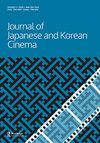框架改编:《W的悲剧》(1984)中的银幕明星与美学
引用次数: 0
摘要
《W的悲剧》(1984)是根据作家夏木静子的推理小说改编的电影。然而,电影制作人并没有制作一部简单的“从页面到屏幕”风格的改编作品,而是选择将原材料改为故事中的故事,将侦探小说改为由剧院公司表演的舞台剧。这一转变将电影的叙事和美学重点从最初的故事转移到了主演矢口丸弘子身上,这反过来又重新确定了改编的利害关系,以实现20世纪80年代日本商业媒体制作的目标。这种在改编模式中对明星身份的强调也产生了新的美学问题,例如使用物体挤在画面边缘,镜头前舞台的处理,以及表演中的表演模式。出现的是改编与括号和引文的交叉点,这些交叉点通过将电影与原始材料、屋久丸自己的银幕名人以及20世纪80年代日本流行文化的跨媒体生产和消费的更广泛氛围联系起来的先行意义形式,不断地将电影、明星和叙事置于“引号”中。本文章由计算机程序翻译,如有差异,请以英文原文为准。
Framing adaptation: screen stardom and aesthetics in Tragedy of W (1984)
ABSTRACT Tragedy of W (1984) is a film adaptation of a mystery novel by the author Natsuki Shizuko. However, rather than producing a straightforward, ‘page to screen’ style adaptation, the filmmakers opted to change the source material into a story-within-story, shifting the whodunnit into a stage play being performed by a theatre company. This transformation shifts the film’s narrative and aesthetic priorities away from the original story and onto its star, Yakushimaru Hiroko, which in turn requalifies the stakes of adaptation toward the goals of commercial media production in 1980s Japan. This emphasis on stardom within the mise-en-abyme mode of adaptation also generates new aesthetic concerns, such as the use of objects to crowd the edge of the frame, the treatment of stages before the camera, and the mode of performing within a performance. What emerges is an intersection of adaptation with qualities of bracketing and citation, which continuously put the film, its star, and its narrative in ‘quotation marks’ by relying on antecedent forms of meaning that connect the film to its source material, Yakushimaru’s own screen celebrity, and the wider climate of transmedia production and consumption of popular culture in 1980s Japan.
求助全文
通过发布文献求助,成功后即可免费获取论文全文。
去求助
来源期刊

Journal of Japanese and Korean Cinema
Arts and Humanities-Visual Arts and Performing Arts
CiteScore
0.60
自引率
0.00%
发文量
16
期刊介绍:
Journal of Japanese and Korean Cinema is a fully refereed forum for the dissemination of scholarly work devoted to the cinemas of Japan and Korea and the interactions and relations between them. The increasingly transnational status of Japanese and Korean cinema underlines the need to deepen our understanding of this ever more globalized film-making region. Journal of Japanese and Korean Cinema is a peer-reviewed journal. The peer review process is double blind. Detailed Instructions for Authors can be found here.
 求助内容:
求助内容: 应助结果提醒方式:
应助结果提醒方式:


